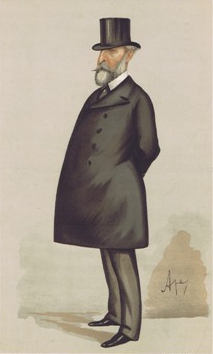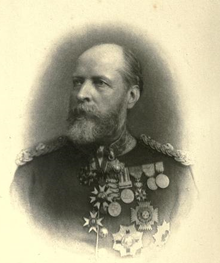Edward Bruce Hamley
Edward Hamley | |
|---|---|
 "English Strategy" Lt-General Hamley as caricatured by Ape (Carlo Pellegrini) inVanity Fair,April 1887 | |
| Born | 27 April 1824 |
| Died | 12 August 1893(aged 69) |
| Allegiance | |
| Service/ | |
| Rank | Lieutenant General |
| Commands | Staff College, Sandhurst |
| Battles/wars | Crimean War Anglo-Egyptian War |
| Awards | Knight Commander of the Order of the Bath Knight Commander of the Order of St Michael and St George |
Lieutenant GeneralSir Edward Bruce HamleyKCBKCMG(27 April 1824 – 12 August 1893) was a British general and military writer and aConservativepolitician who sat in theHouse of Commonsfrom 1885 to 1892.
Early life
[edit]Hamley was the youngest son of Vice-Admiral William Hamley, born atBodmin,Cornwall, and entered theRoyal Artilleryin 1843.[1]
Career
[edit]Hamley was promoted captain in 1850, and in 1851 went toGibraltar,where he began his literary career by contributing articles to magazines. He served throughout theCrimean campaignasaide-de-camptoSir Richard Dacres,commanding theartillery,taking part in all the operations with distinction, and becoming successively major and lieutenant-colonel by brevet. He also received theCBand French and Turkish orders.[1]
During the war Hamley contributed toBlackwood's Magazinean admirable account of the progress of the campaign, which was afterwards republished. The combination in Hamley of literary and military ability secured for him in 1859 the professorship of military history at the newStaff College at Sandhurst,from which in 1866 he went to the council of military education, returning in 1870 to the Staff College ascommandant.[1]
From 1879 to 1881 Hamley was British commissioner successively for thedelimitationof the frontiers of theOttoman EmpireandBulgaria,Ottoman Empire in Asia and theRussian Empire,and Ottoman Empire andGreece,and was rewarded with theKCMG.Promoted colonel in 1863, he became a lieutenant-general in 1882, when he commanded the2nd Divisionof the expedition to Egypt underLord Wolseley,and led his troops in theBattle of Tell El Kebir,for which he received theKCB,the thanks of Parliament, and 2nd class of theOrder of Osmanieh.[1]
Hamley considered that his services inEgypthad been insufficiently recognised in Lord Wolseley's despatches, and expressed his indignation freely, but he had no sufficient ground for supposing that there was any intention to belittle his services.[1]
Later life
[edit]From 1885 until 1892, Hamley was Member of Parliament forBirkenheadin parliament in theConservativeinterest. He was promoted togeneralin 1890.[2]He was appointed Honorary Colonel of the2nd Middlesex Artillery Volunteerson 6 November 1887.[3]Hamley is buried inBrompton Cemetery,London.[4]
Writings
[edit]Hamley was a clever and versatile writer. His principal work,The Operations of War,published in 1866, became a text-book of military instruction. It was praised by the German GeneralHelmuth von Moltke,Chief of thePrussian General Staff,and until 1894 it was the sole text used in the entrance examination for the Camberley Staff College. He also published some pamphlets on national defence, was a frequent contributor to magazines, and the author of several novels, of which perhaps the best known isLady Lee's Widowhood.[1]
Hamley took interest inanimal welfare.[5]He authoredOur Poor Relations,in 1872. The book reflected his compassion for animals and his horror of their abuse. He attackedvivisectionand condemned the collecting of moths.[5]
The War in the Crimeawas published in 1891 by Seeley and Co., London. Within this publication, was a complete overview of events leading up to the war in the Crimea all the way through to the close of the war.
Selected publications
[edit]
- Lady Lee's Widowhood(2 volumes, 1854)
- The Story of the Campaign of Sebastopol(1855)
- A Legend of Gibraltar, and Lazaroo's Legacy(1858)
- Wellington's Career(1860)
- The Operations of War Explained and Illustrated(1866)
- Our Poor Relations: A Philozoic Essay(1872)
- A Chapter on Outposts(1875)
- Staff College Exercises(1875)
- Voltaire(1877)
- The Strategical Conditions of Our Indian N.W. Frontier(1879)
- Thomas Carlyle(1881)
- Shakespeare's Funeral and Other Papers(1889)
- National Defence(1889)
- The War in the Crimea(1891)
References
[edit]- ^abcdefChisholm 1911.
- ^"No. 26074".The London Gazette.29 July 1890. p. 4172.
- ^Monthly Army List1887–1893.
- ^Brompton Cemetery
- ^abHandley, Graham. (1996).The Two Georges and The Gunner.The George Eliot Review272: 56–60.
- This article incorporates text from a publication now in thepublic domain:Chisholm, Hugh,ed. (1911). "Hamley, Sir Edward Bruce".Encyclopædia Britannica.Vol. 12 (11th ed.). Cambridge University Press. p. 896.
- Byron Farwell,"Queen Victoria's little wars", Wordsworth Editions,ISBN1-84022-216-6
Further reading
[edit]- Alexander Innes Shand.(1895).The Life of General Sir Edward Bruce Hamley, K.C.B., K.C.M.G.Edinburgh and London: W. Blackwood and Sons.OCLC3351673
External links
[edit] Media related toEdward Bruce Hamleyat Wikimedia Commons
Media related toEdward Bruce Hamleyat Wikimedia Commons Works by or aboutEdward Bruce HamleyatWikisource
Works by or aboutEdward Bruce HamleyatWikisource- Hansard1803–2005:contributions in Parliament by Edward Bruce Hamley
- Portraits of Edward Bruce Hamleyat theNational Portrait Gallery, London
- 1824 births
- 1893 deaths
- Military personnel from Cornwall
- British anti-vivisectionists
- British animal welfare scholars
- British Army lieutenant generals
- British Army personnel of the Anglo-Egyptian War
- British Army personnel of the Crimean War
- British military writers
- Burials at Brompton Cemetery
- Commandants of the Staff College, Camberley
- Conservative Party (UK) MPs for English constituencies
- Knights Commander of the Order of St Michael and St George
- Knights Commander of the Order of the Bath
- People from Bodmin
- Royal Artillery officers
- UK MPs 1885–1886
- UK MPs 1886–1892
- 19th-century English novelists
- English male novelists
- Victorian novelists
- English military writers
- English anti-vivisectionists
